Grammy-winning Iranian singer says he faces bans from public venues
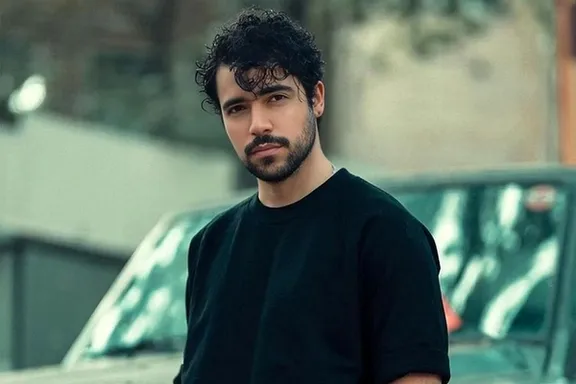
Iranian singer and songwriter Shervin Hajipour said he is facing new restrictions, including being barred from entering a gym and attending concerts.

Iranian singer and songwriter Shervin Hajipour said he is facing new restrictions, including being barred from entering a gym and attending concerts.
In an Instagram video story, he said that when he asked a club security guard why he was denied entry, the guard replied: “Because you are Shervin.”
Iran's clerical rulers have eased enforcement of Islamic veiling laws, paused a draconian new hijab law and looked the other way as once-banned outdoor concerts proliferate.
But crackdowns on dissidents and political speech have sharply mounted since the conflict, according to rights groups.
Hajipour is the creator of the protest song Baraye (“For…”), which became a global anthem for Iran’s nationwide Woman, Life, Freedom movement following the 2022 death of a young woman, Mahsa Amini, in morality police custody.
He was briefly arrested in September 2022 shortly after the song went viral.
In 2023, Hajipour won the inaugural Grammy Award for Best Song for Social Change for the son.
The next year, a court sentenced him to three years and eight months in prison on charges including propaganda against the Islamic Republic and inciting and encouraging people to commit acts of violence and disturbance with the intention of harming national security.
He was also banned from leaving the country for two years.
The court ordered him to produce monthly one-page works on “the crimes of America against humanity” and compose a musical piece about “America’s crimes and its violations of human rights,” according to a copy of the verdict he shared in an Instagram post.
It also directed him to summarize books by Morteza Motahhari, a leading ideologue of the Islamic Republic whose writings on women morality and politics remain central to state doctrine, and to compile cultural and scientific “achievements of the Islamic Republic” and present them in digital form.
In September 2024, his case was dismissed under a clemency order issued by Iran’s Supreme Leader, effectively granting him a pardon.
Hajipour said in his new video that despite the restrictions, he intends to continue living in Iran.
“I did not stay in this country to sit in a corner of my house or be humiliated or be unable to work or exercise,” he said.




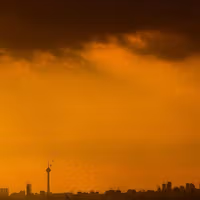


The Institute for Science and International Security (ISIS) citing satellite imagery reported apparent construction at Taleghan 2, a former nuclear weapons development facility within Iran's Parchin military complex.
“The imagery, captured between September and November 2025, shows a large cylindrical vessel - approximately 36 meters long and 12 meters in diameter—housed inside a new domed building,” the report said on Tuesday.
"What exactly the object is cannot be completely determined from the satellite imagery alone, however, its shape and metal structure are consistent with previous high-explosive test chambers Iran has built," the report added. "The facility is likely entering an advanced stage of construction."
Taleghan 2 is located near Taleghan 1; both are part of the Parchin military complex, about 20 miles southeast of Tehran.
“Reconstruction began as early as May 2025 and has progressed quickly despite the prior damage,” the report said.
The institute said both Taleghan sites were part of Iran’s AMAD Plan, an alleged covert project aimed at developing nuclear weapons.
The AMAD Plan ran from the late 1990s until 2003, according to the International Atomic Energy Agency (IAEA).
Iran denies the existence of the AMAD Plan, insisting its nuclear program is purely peaceful and that nuclear weapons are forbidden by a religious decree from Supreme Leader Ali Khamenei.
The institute which monitors sites activity satellite imagery, reported last month on Iran’s renewed activity in Taleghan 2 site.
“By June 12, groundwork and foundations had been laid, and by late August, a new arch-roofed structure about 45 by 17 meters was under construction over the temporary cover, with two smaller buildings nearby,” the institute added.
The UN nuclear watchdog said on Wednesday it needs more Iranian cooperation to restore full inspections at sites hit in June’s strikes, warning that verification of enriched uranium stocks is “long overdue.”
Three students were taken to a hospital after officials at a girls’ technical school in Shahr-e Rey south of Tehran allegedly assaulted pupils during searches for mobile phones, according to videos and eyewitness accounts sent to Iran International.
Tehran Province’s education chief Yousef Baharloo said tensions at the school erupted on Wednesday after staff confiscated several students’ phones, adding that he had received no reports of physical injury to the students.
But eyewitnesses drew a different picture.
“They grabbed us by the collars in groups when we entered the school and dragged us inside. They forced us to kneel and threw our belongings on the ground. They touched our private parts and checked our bodies completely,” one student said.
“On the pretext of taking mobile phones and picking on us for our hijabs, they went after the students. They even sent the Special Unit and closed the school gate,” another eye witness said, referring to security forces.
Videos and images shared with Iran International appeared to show emergency personnel and ambulances at the school following the altercation.
The incident, which occurred on Tuesday, raised fresh concerns about student safety and oversight by Iran’s Education Ministry.
Families gathered outside the school on Wednesday in protest, but the principal was not present. Security forces were later deployed around the site.
"The school principal even criticized the students' hairstyles and appearance, and during inspections, he treated them with very vulgar language and violent behavior,” a third eyewitness said, describing the original altercation.
"The principal would beat the students and throw their phones at them," the eyewitness added. "He even smashed the camera of one of the students, whose major was photography, against the wall."
The case follows earlier incidents this year, including the suicide of a 12-year-old student in Shiraz in October and the death of a 14-year-old in Zanjan in August after punishment at school, which have intensified concern about violence and a lack of accountability in Iran’s education system.
US President Donald Trump said on Wednesday that its Mideast arch-foe Iran was seeking to reach a deal and that his administration would "probably" achieve one.
In his address to a US-Saudi business forum in Washington DC with visiting Saudi Crown Prince Mohammed bin Salman in attendance, Trump said US strikes on Iranian nuclear sites in June had protected Riyadh.
"We took the Dark Cloud away from your country, it was called Iran and its nuclear capability, and we obliterated that very quickly and strongly and powerfully.
But that was a real cloud over the whole Middle East," he said.
"Now they want to make a deal. They want to make a deal. They want to see if they can work out a deal with us, and we'll be doing that probably. But that was a terrible cloud that you had to live with for a long time."
At a joint appearance in the White House on Tuesday, Trump said the United States was talking to Tehran, which he said "very badly” wanted a deal with Washington.
Tehran flatly denied any such talks were underway earlier on Wednesday.
“There is no process of negotiation between Iran and the United States,” Foreign Ministry spokesman Esmail Baghaei told reporters in Tehran.
“Talking to a side that does not believe in mutual respect and takes pride in military aggression against Iran has no logical justification.”
Iran has denied seeking a nuclear weapon and has rejected US demands that it end domestic enrichment, rein in its missile program and cut off help for its armed Mideast allies.
The impasse over the disputed program festers despite Trump's assertion that the US attacks had "obliterated" it.
A new school curriculum mandated by Iran’s education ministry has cast a 12-day war with Israel in June as a national triumph, underscoring a bid by the country's clerical rulers to boost support following the punishing conflict.
Under a new directive titled “We Defend Our Iran,” the ministry ordered classes from elementary to high school to praise the actions of the country's leadership, military and people.
The new educational materials reviewed by Iran International were distributed to schools and made available online earlier this month.
The program aims to cultivate patriotic virtue, according to a directive signed by Education Minister Alireza Kazemi and circulated to provincial departments.
The initiative was “a tribute to the miraculous endurance of the Iranian nation during the 12-day imposed war,” he wrote.
New study materials, Kazemi added, seek to “strengthen national dignity, unity and deterrence,” and to raise students who can “face social and political challenges responsibly and wisely.”
Battle of narratives
As Iran-US nuclear talks appeared to falter, Israel launched a surprise military attack on its Mideast arch-foe on June 13.
The strikes killed senior nuclear scientists along with hundreds of military personnel and civilians. Iranian counterattacks killed 32 Israeli civilians and an off-duty soldier.
Joining the conflict, the United States attacked three Iranian nuclear sites and Iran responded with missile attacks on a US airbase in Qatar before US President Donald Trump enforced a ceasefire.
Israel promptly said it had achieved its military goals while Trump declared Iran's nuclear program had been "obliterated."
Tehran officialdom quickly said the US ceasefire sought to prevent further damaging missile volleys and that Iran had prevailed in the war, emerging more unified.
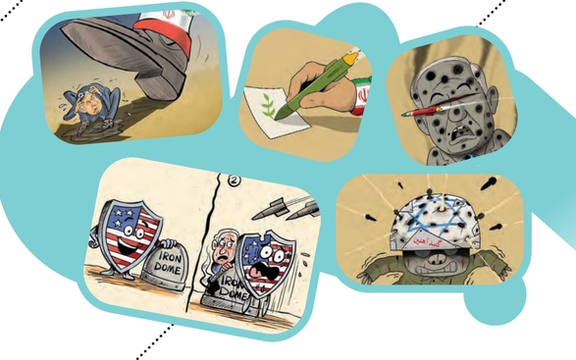
Hack Israeli jets
The new educational materials cast this doctrine as moral and patriotic truth, extending from missile engineering to nuclear research.
One high school assignment instructs pupils to “hold a class debate on the advantages and disadvantages of enriching uranium inside the country versus importing enriched uranium.”
Another adds: “Write a two-page outline for a movie in which Iranian students hack into the computer systems of Israeli fighter jets and change the course of events. Share your plan with your teacher and classmates.”
The tone is lively, even playful, framing national defense as a creative activity comprehensible to children.
Iranian officials quickly and now routinely characterize the perseverance of Iran's ruling system as a victory in itself and the messaging now extends beyond sermons and television news programs to the classroom.
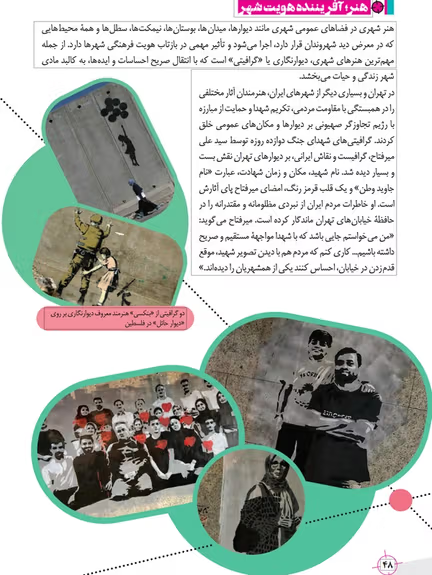
Authorities have quashed with deadly force several youth-led protest movements in recent decades and style themselves a bulwark against foreign-led sedition plots.
Still, the course materials indicate Tehran remains determined to purvey state ideology on Iran's youth.
The textbook for younger students, “The 12-Day War,” sets out twenty-five hours of classroom teaching that encourage pupils to see unity, creativity and belief as the reasons Iran prevailed. The lessons blend moral stories with political instruction and domestic detail, grounding the idea of national defense in everyday life.
In one chapter, children visit their grandparents’ home. Over tea, the adults recall the war. “Israel thought it could disrupt the country by killing our commanders,” says Uncle Hossein in the story, “but our Leader quickly appointed successors and restored order.”
The grandfather adds, “Iran had long prepared itself for defense and built powerful, precise missiles for such days.” The grandmother reminds the children that “people helped each other during those days,” while the narrator concludes, “When we are united with our Leader, like one family, we are at our strongest.”
The chapter ends with the line that gives the book its theme: “We are stronger together.” It turns survival into a moral lesson about obedience, faith and collective strength.
Elsewhere, QR codes lead to short video clips. One shows schoolgirls, around nine years old, singing, “This is Iran. If anyone looks at my country the wrong way, I will not forgive them. If needed, I will sacrifice myself. I’m a girl, but I’m strong. God is with me.”
In Islam, nine marks the age of religious maturity for girls, giving the performance a note of solemn duty beneath its cheer.
Other exercises tie national defense to civic behavior. Students are asked to draw family members helping during blackouts or natural disasters, and to write short reflections on how “science and faith together protect the homeland.”
The blending of domestic scenes, religious devotion and military imagery makes the idea of resistance feel both intimate and ordinary.
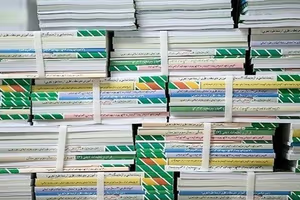
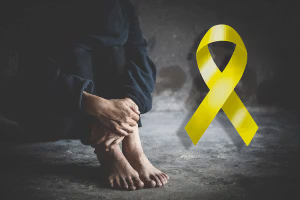
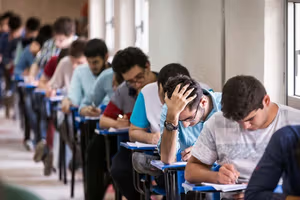
Israel 'unnatural, dangerous'
Across all levels, Israel is portrayed as the main disruptor of peace in the region and the United States as its enabler.
High-school materials offer more advanced characterizations of arch-enemy Israel, calling it an “unnatural and dangerous regime” and asks students to prove it visually. “With three simple pictures,” it instructs, “show your classmates why Israel is an unnatural and dangerous regime. For example: it has no fixed borders.”
Another prompt begins with: “In your opinion, what does the fact that the Israeli regime, unlike other countries, has no defined borders say about its nature?”
Students are then guided to make an infographic to express the point. At the top of the page, they are told to write: "Israel is unnatural and dangerous because" and fill in the rest with short captions and sketches.
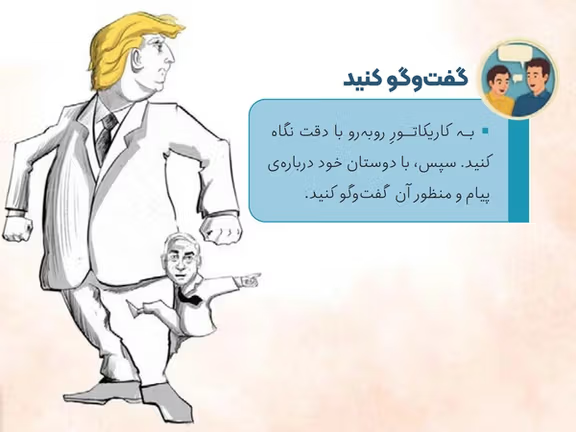
Safavid rout
In some of the new exercises, students are asked to name and build paper models of Iranian missiles and discuss how families can help defend the country.
Another passage recalls the 1514 Battle of Chaldiran, when Safavid Iran lost to the Ottomans for lacking modern weapons, a parable of vigilance and modernization.
Other sections teach how to manage blackouts or natural disasters, blending civic duty with preparedness for crisis.
The book deepens the use of national history in the curriculum, drawing on Shah Ismail Safavid and earlier dynasties alongside Islamic and revolutionary narratives, part of a broader effort to fuse religion, statehood and pride in Iranian endurance.
That emphasis mirrors the nationalist tone of Supreme Leader Ali Khamenei’s speeches following the war. Citing a coup in 1921 and the 1953 US-backed overthrow of Prime Minister Mohammad Mossadegh, he has urged Iranians to remember “both sweet victories and bitter events” so that “they are not repeated.”
He described the United States as “inherently arrogant,” blamed foreign powers for Iran’s historic setbacks, and told young people that “the remedy for many of our problems is to become strong.”
In his telling, national power in its military, scientific, and moral forms is the safeguard of independence, a message now embedded in the nation’s classrooms.
That same logic now shapes how the next generation is taught: Iran’s strength, the school materials aim to ensure, must be shored up by its next generation.
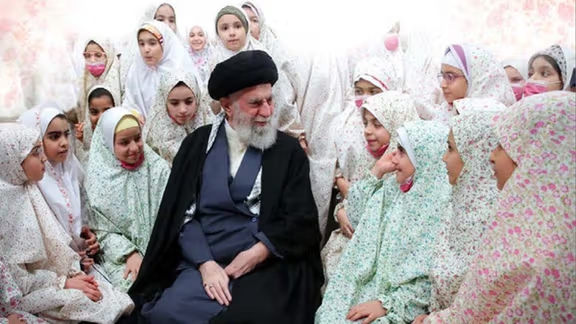
Iran’s former president Mohammad Khatami said most people in the country are more concerned with living their lives amid worsening economic conditions than with who governs them.
“Eighty percent of the Iranian people are not political in a certain sense, and it does not matter much to them who governs or how; they only want to live and to have security and a clearer outlook for the future,” Khatami said.
He said the country has never experienced a situation as severe as the one it faces now, with challenges and threats unlike anything seen since the 1979 Islamic revolution.
Khatami compared Iran’s governing system to “a sturdy tree” that had long endured hardship but now faced mounting dangers.
“This sturdy tree may be able to withstand drought and storms for many years, but today the internal and external threats and problems are so vast and significant that there is a fear this sturdy tree may suddenly wither and collapse, may that day never come,” he said.
Economic hardship
The former reformist president's remarks come as the government struggles to contain soaring prices and widening poverty.
According to Iran's Parliament’s Research Center, over a third of Iranians live in poverty.
Rising inflation and a weakening currency have helped drive up costs of living in Iran and economic pain has deepened as Western and European-triggered international sanctions compound the country's international isolation.
Earlier this month, a senior economist at Iran's Ahvaz University, Morteza Afghah, warned that annual inflation could exceed 60% by the end of the Iranian calendar year (March 2026).
Surveys say otherwise
Last week, a survey by Tehran-based news site Rouydad24 found that 92% of Iranians are unhappy with the country’s direction.
“What is clear is that total public satisfaction with all governments since the revolution is now overshadowed by a 92 percent dissatisfaction with the country’s current situation,” Rouydad24 said.
According to the outlet, the level of satisfaction with Khatami's successor Mahmoud Ahmadinejad’s administration was highest overall, while those of Hassan Rouhani and Masoud Pezeshkian ranked lowest.
Another survey conducted by a Netherlands-based polling institute last year found that the majority of Iranians would vote for either a regime change or a structural transition away from the Islamic Republic.
The Group for Analyzing and Measuring Attitudes in Iran (GAMAAN), which conducted the survey in June 2024, said it polled more than 77,000 respondents inside Iran, weighting the results to represent the literate adult population.
“A majority of the population opposes the Islamic Republic and supports changing or transforming the political system,” the report’s author Ammar Maleki said.
Only around 20 percent of respondents want the Islamic Republic to remain in power, according to the survey.
The survey found no single consensus on what system should replace the current order. A secular republic was backed by 26 percent of respondents, while 21 percent supported a monarchy.
Another 22 percent said they lacked enough information to decide, and 11 percent said that the form of an alternative system was not important so long as change occurred.